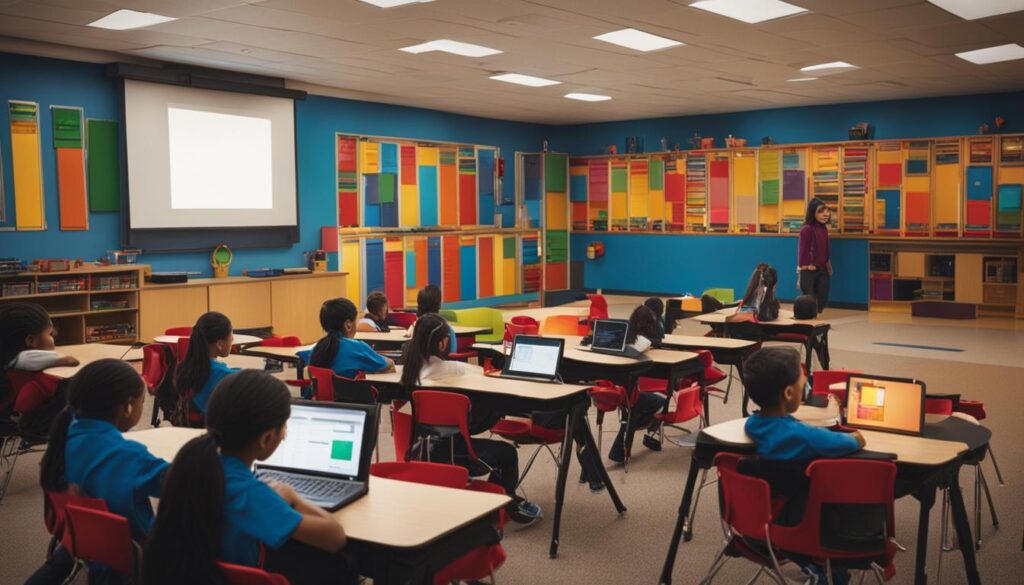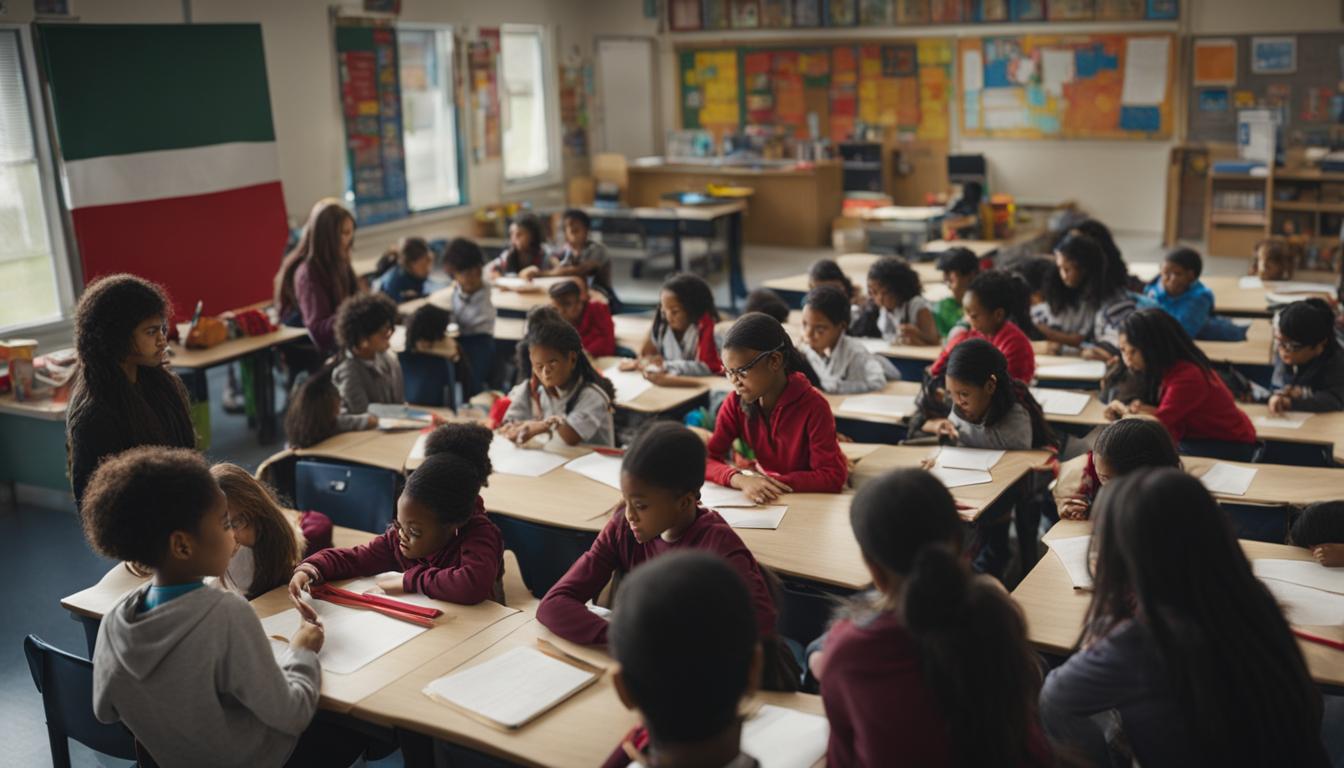Canadians are known for their dedication to education and their commitment to providing students with the best possible learning experience. But are traditional teaching methods truly preparing students for the rapidly changing world? Are there more effective models that can better engage and empower students?
In this article, we will explore the transformative power of student-centered models in Canada’s education system. We will delve into the various approaches and strategies used in student-centered learning, highlighting the benefits and outcomes for students. The focus will be on how these models are reshaping the traditional education system in Canada and promoting individual potential and inclusive growth.
Join us on this journey as we uncover the innovative ways Canada is revolutionizing education and ask ourselves: Could student-centered models be the key to unlocking the full potential of every Canadian student?
Contents
- 1 21st Century Skills Through Project-Based Learning
- 2 Indigenous Languages and Culture in Canada
- 3 Math Proficiency Through Mastery Learning
- 4 Building Transferable Skills in Ontario
- 5 Pillars of Ontario's Excellence
- 6 Assessments in Ontario Schools
- 7 Indigenous Identity in Canadian Schools
- 8 Championing Equity in Curriculum
- 9 Global Citizenship in Canada
- 10 Evaluating Innovative Approaches
- 11 FAQ
- 11.1 What is the significance of student-centered models in Canada’s education system?
- 11.2 How does project-based learning foster 21st-century skills in Canadian schools?
- 11.3 Why is it important to incorporate Indigenous perspectives and languages into the Canadian curriculum?
- 11.4 How does mastery learning improve math proficiency in Canadian schools?
- 11.5 What is the role of transferable skills in Ontario’s education system?
- 11.6 What are the key components of Ontario’s student-centered curriculum?
- 11.7 How are assessments becoming more student-centered in Ontario schools?
- 11.8 What is the importance of fostering Indigenous identity in Canadian schools?
- 11.9 How does Canada champion equity in the curriculum?
- 11.10 How does Canada promote global citizenship in its schools?
- 11.11 How are innovative approaches evaluated in Canadian education?
- 12 Source Links
Key Takeaways:
- Student-centered models are reshaping the traditional education system in Canada.
- These models promote individual potential and inclusive growth.
- Student-centered learning engages and empowers students.
- Canada is at the forefront of innovative education approaches.
- Student-centered models may hold the key to unlocking every student’s full potential.
21st Century Skills Through Project-Based Learning
In Canadian schools, project-based learning has emerged as a powerful approach to foster 21st century skills among students. This student-centered instructional strategy brings together personalized learning approaches and real-world experiences to enhance critical thinking, problem-solving, and collaboration skills.
Project-based learning revolves around the idea of engaging students in hands-on projects that are relevant and meaningful to their lives. By working on projects, students have the opportunity to apply their knowledge, develop practical skills, and explore their areas of interest.
One of the key principles of project-based learning is its focus on collaboration. Students collaborate with their peers, teachers, and community members to tackle real-world problems, helping them develop strong communication and teamwork skills essential for the 21st century.
Benefits of Project-Based Learning:
- Develops critical thinking and problem-solving skills
- Enhances creativity and innovation
- Promotes effective communication and collaboration
- Fosters a sense of ownership and engagement in learning
- Prepares students for the challenges of the future workforce
Canadian schools have successfully implemented project-based learning initiatives that have yielded impressive results. By integrating project-based learning into the curriculum, schools have witnessed increased student motivation, deeper understanding of content, and improved retention of knowledge.
To illustrate the impact of project-based learning in Canadian schools, let’s take a look at a successful case study:
“At Maple High School, students participated in a semester-long project that focused on sustainable energy solutions. Through this project, students conducted research, designed prototypes, and presented their findings to a panel of experts. Not only did the students acquire a deep understanding of sustainable energy, but they also developed valuable skills in teamwork, problem-solving, and public speaking. This project-based learning initiative at Maple High School truly exemplified the power of student-centered instructional strategies in nurturing 21st century skills.”
Project-based learning in Canadian schools is transforming education by providing students with authentic learning experiences that prepare them for success in the rapidly changing world. Through these personalized learning approaches, students develop the skills and competencies necessary to thrive in the 21st century workforce.
Indigenous Languages and Culture in Canada

In the Canadian education system, the preservation and promotion of Indigenous languages and culture hold significant importance. Efforts are being made to incorporate Indigenous perspectives, teachings, and languages into the curriculum to ensure a more inclusive and culturally responsive education for all students.
Culturally responsive teaching practices play a vital role in honoring and respecting the diverse cultural backgrounds of students. By integrating Indigenous knowledge and traditions into the classroom, educators can create an environment that fosters a sense of belonging and identity among Indigenous students, while also promoting understanding and appreciation among non-Indigenous students.
Indigenous education models in Canada are designed to empower Indigenous students, celebrate their heritage, and facilitate their academic success. These models take into account the historical and present-day impacts of colonization on Indigenous communities and seek to address the unique needs and challenges faced by Indigenous students.
Through indigenous education models, culturally responsive teaching methods, and reconciliation efforts, schools in Canada are committed to building positive relationships with Indigenous communities and promoting healing and understanding. Education plays a crucial role in the reconciliation process by providing opportunities for dialogue, shared learning, and the recognition of Indigenous rights and contributions.
| Benefits of Indigenous Education Models in Canada |
|---|
| 1. Fosters cultural pride and identity |
| 2. Increases academic engagement and success among Indigenous students |
| 3. Promotes intercultural understanding and respect |
| 4. Creates inclusive and equitable learning environments |
| 5. Strengthens relationships between schools and Indigenous communities |
By embracing Indigenous languages and culture, schools in Canada are taking significant steps towards reconciliation and building a more inclusive education system. These efforts contribute to nurturing the next generation of informed and empathetic individuals who deeply understand and appreciate the richness of Indigenous heritage and perspectives.
Math Proficiency Through Mastery Learning
In Canadian schools, mastery learning is proving to be a powerful approach to enhance math proficiency among students. By delving into the principles and strategies of mastery-based learning, educators are creating an environment that fosters deep understanding and mastery of mathematical concepts.
Mastery-based learning focuses on providing personalized and flexible learning environments that cater to the individual needs of students. This approach allows students to progress at their own pace, ensuring they have a solid foundation before moving on to more advanced concepts. By nurturing a deep understanding of math, students develop the skills necessary for higher-level thinking and problem-solving.
“Mastery learning encourages students to engage with mathematics in a meaningful way, promoting curiosity, confidence, and a growth mindset.”
Research has shown that mastery-based learning improves student achievement and engagement in mathematics. Students become more motivated and confident as they experience success and build a strong mathematical foundation. They acquire a deeper understanding of mathematical concepts and develop the critical thinking skills necessary to solve complex problems.
Flexible learning environments play a vital role in supporting mastery learning. By leveraging technology and innovative teaching strategies, educators create adaptable and personalized learning experiences. Students have access to a range of resources and tools that cater to their unique learning styles and preferences.
Implementing mastery-based learning in math education is an ongoing journey, and many schools in Canada have seen remarkable success in adopting this approach. From elementary to high school, educators are witnessing significant improvements in math proficiency and student engagement.
By prioritizing mastery learning and providing flexible learning environments, Canada is paving the way for a future where all students can achieve math proficiency and reach their full potential.
Explore how Canada Global Academy’s School Partnership Program is revolutionizing schools. Visit https://canadaglobalacademy.com/school-partnership-program/ to learn more.
Building Transferable Skills in Ontario

In today’s rapidly evolving world, it is crucial for students to develop transferable skills that will prepare them for the future. Ontario’s education system recognizes the importance of equipping students with skills such as critical thinking, communication, collaboration, and creativity. These skills go beyond subject-specific knowledge and enable students to adapt and succeed in a variety of contexts.
One of the key factors in building transferable skills is creating inclusive classrooms that foster a sense of belonging for all students. In inclusive classrooms, students from diverse backgrounds and abilities are provided with equitable opportunities to learn and grow. This not only promotes empathy and understanding but also enhances collaboration and communication skills.
Adaptable learning spaces also play a vital role in cultivating transferable skills. These spaces are designed to accommodate different learning styles and preferences, allowing students to engage in hands-on activities, group discussions, and individualized projects. Adaptable learning spaces encourage creativity and innovation while promoting independent thinking and problem-solving.
Inclusive classrooms and adaptable learning spaces are essential elements of Ontario’s education system, creating an environment where students can develop the transferable skills they need to thrive in the 21st century.
By prioritizing transferable skills, Ontario is ensuring that students are well-equipped to navigate an ever-changing global landscape. These skills not only prepare students for further education and future careers but also enable them to contribute meaningfully to society.
Continue reading the next section to learn more about the pillars of Ontario’s excellence in education.
Pillars of Ontario's Excellence

Ontario’s education system stands as a beacon of excellence, leading the way in student-centered education. At the core of this system are the pillars that uphold its success: a student-centered curriculum, student-centred teaching methods, and the integration of 21st century skills. These pillars have transformed the educational landscape in Ontario, empowering students to thrive and reach their full potential.
The student-centered curriculum in Ontario places the needs and interests of students at the forefront. It recognizes that every student is unique and encompasses personalized learning approaches that cater to individual strengths, passions, and learning styles. By tailoring the curriculum to meet the diverse needs of students, Ontario ensures that education is engaging, relevant, and meaningful.
Student-centred teaching methods form another crucial pillar of Ontario’s excellence. These methods prioritize active learning, collaboration, and critical thinking, fostering an environment that promotes student agency, creativity, and problem-solving skills. Ontario teachers embrace innovative instructional strategies that empower students to take ownership of their learning journey and become active participants in the classroom.
“When students are at the center of their education, they become agents of change, confident and capable of navigating the complexities of the modern world.” – Dr. Emily Wright, Director of Education, Ontario School Board
Furthermore, the integration of 21st century skills is a key component of Ontario’s student-centered approach. These skills encompass critical thinking, communication, collaboration, and creativity, preparing students for success in an ever-evolving society. Ontario schools prioritize the development of these skills, equipping students with the tools they need to adapt, innovate, and thrive in the global economy.
The outcomes of Ontario’s student-centered education system speak for themselves. Students experience increased engagement, improved academic achievement, and a love for lifelong learning. They develop essential skills that are applicable beyond the classroom, enabling them to succeed in their future careers and contribute positively to society.
| Pillars of Ontario’s Excellence | Key Components |
|---|---|
| Student-Centered Curriculum | – Personalized learning approaches – Tailored to individual students’ needs – Engaging and relevant education |
| Student-Centred Teaching Methods | – Active learning and collaboration – Fostering student agency and creativity – Innovative instructional strategies |
| Integration of 21st Century Skills | – Critical thinking and problem-solving – Communication and collaboration – Preparation for a rapidly changing world |
Ontario’s commitment to student-centered education continues to shape the future of learning. Through its pillars of excellence, the education system in Ontario is creating a generation of empowered, innovative, and adaptable learners who are prepared to thrive in an increasingly complex and interconnected world.
Assessments in Ontario Schools

Assessments in Ontario schools have undergone a significant transformation in recent years. Rather than relying solely on traditional exams and standardized tests, educators in Ontario have embraced more student-centered assessment methods. These approaches aim to promote student agency, ownership, and self-reflection in the learning process.
One of the innovative assessment methods gaining popularity in Ontario is student-led conferences. In these conferences, students take an active role in showcasing their learning progress and achievements to parents and educators. By actively participating in the assessment process, students gain a deeper understanding of their strengths, areas for improvement, and set goals for their academic growth.
In addition to student-led conferences, Ontario schools are also adopting student-generated transcripts as a means of assessment. Instead of relying solely on traditional report cards, student-generated transcripts provide a comprehensive overview of a student’s learning journey. These transcripts include evidence of learning, such as projects, presentations, and reflections, capturing a holistic view of the student’s knowledge and skills.
By incorporating these student-centered assessment methods, Ontario schools are creating opportunities for students to take ownership of their learning and develop essential skills such as self-reflection, communication, and goal-setting. This shift in assessment practices aligns with the broader goal of promoting personalized and inclusive education in Ontario.
Benefits of Student-Centered Assessments
Student-centered assessments offer several benefits to both students and educators:
- Empowering students: Student-centered assessments empower students to become active participants in their learning journey and take ownership of their achievements.
- Enhancing self-reflection: By reflecting on their progress, students develop a deeper understanding of their strengths and areas for growth, enabling them to set meaningful goals.
- Building communication skills: Student-led conferences provide a platform for students to effectively communicate their learning progress and articulate their thoughts and ideas.
- Promoting holistic assessment: Student-generated transcripts offer a more comprehensive and holistic view of a student’s knowledge and skills, capturing a broader range of achievements beyond traditional exams.
- Encouraging personalized learning: With student-centered assessments, educators can tailor their instruction to meet individual student needs and provide targeted support.
Through these student-centered assessment methods, Ontario schools are fostering a culture of active learning, self-reflection, and continuous improvement. This progressive approach to assessment aligns with the broader vision of preparing students to thrive in an ever-changing world.
Achieving Educational Excellence Through Student-Centered Assessments
| Benefits | Student-Led Conferences | Student-Generated Transcripts |
|---|---|---|
| Empowering Students | Allows students to take ownership of their learning and achievements | Encourages students to actively engage in curating evidence of their learning journey |
| Enhancing Self-Reflection | Facilitates students in reflecting on their progress and setting meaningful goals | Promotes self-reflection and a deeper understanding of strengths and areas for improvement |
| Building Communication Skills | Provides students with an opportunity to effectively communicate their learning progress to parents and educators | Enhances communication skills as students curate and articulate their learning experiences |
| Promoting Holistic Assessment | Captures a broader range of achievements beyond traditional exams | Offers a comprehensive view of a student’s knowledge and skills |
| Encouraging Personalized Learning | Enables educators to tailor instruction to meet individual student needs | Supports personalized learning by showcasing evidence of growth and development |
By embracing student-centered assessment methods such as student-led conferences and student-generated transcripts, Ontario schools are paving the way for educational excellence. These assessments promote student agency, foster essential skills, and provide a more comprehensive view of student achievements. As a result, students in Ontario are empowered, engaged, and better equipped for success in today’s dynamic world.
Indigenous Identity in Canadian Schools

Education plays a pivotal role in fostering Indigenous identity in Canadian schools. By promoting Indigenous culture, history, and language, schools contribute to the sense of identity and belonging for Indigenous students. This section will explore the importance of embracing Indigenous education frameworks to create a more inclusive educational environment.
One way schools can honor Indigenous identity is by incorporating Indigenous knowledge and teachings into the curriculum. By integrating Indigenous perspectives and stories, students gain a deeper understanding and appreciation of Indigenous culture, allowing for richer and more diverse learning experiences.
Diversity and inclusion are crucial aspects of creating an environment that supports Indigenous students. Schools need to provide safe spaces where Indigenous customs, traditions, and languages are respected and celebrated. This inclusivity enables Indigenous students to feel valued, acknowledged, and empowered within the school community.
Furthermore, it is essential for educators to receive training and support in incorporating Indigenous education frameworks into their teaching practices. By developing a deep understanding of Indigenous cultures and histories, teachers can create a learning environment that reflects the diverse needs and experiences of their Indigenous students.
Canada’s commitment to diversity and inclusion in schools extends beyond the classroom walls. It involves engaging with Indigenous communities and fostering strong partnerships that promote dialogue and collaboration. Through respectful and meaningful relationships, schools can better address the unique challenges and opportunities facing Indigenous students.
In conclusion, prioritizing Indigenous identity in Canadian schools is vital for creating an education system that supports and embraces the diverse cultures and histories of Indigenous communities. By incorporating Indigenous education frameworks, promoting diversity and inclusion, and building meaningful partnerships, schools can foster an inclusive learning environment where Indigenous students can thrive.
Championing Equity in Curriculum

In Canada, there is a growing recognition of the importance of championing equity in the curriculum. Creating a curriculum that is inclusive, diverse, and culturally responsive is key to providing all students with an equal opportunity to succeed and thrive.
One aspect of championing equity in schools is the incorporation of restorative justice practices. Restorative justice focuses on repairing harm, addressing conflicts, and building a sense of community within the school environment. By implementing restorative justice practices, schools can create a more equitable learning environment where all students feel valued and supported.
Efforts are being made across Canadian schools to develop initiatives and strategies that promote equity in the curriculum. These initiatives aim to ensure that students from all backgrounds have access to quality education and resources, regardless of their socio-economic status, ethnic background, or abilities. By championing diversity in schools, we can create an educational system that celebrates and respects the unique identities and experiences of every student.
“Education is the most powerful weapon which you can use to change the world.” – Nelson Mandela
Through inclusive and diverse curriculum, Canada is making significant progress in fostering an environment that promotes equity, inclusivity, and social justice. By embracing the principles of inclusive education and leveraging restorative justice practices, Canadian schools are paving the way for a brighter and more equitable future.
| Initiatives and Strategies | Key Outcomes |
|---|---|
| Integration of diverse perspectives and voices in the curriculum | Promotes cultural understanding and empathy |
| Support for inclusive instructional practices | Addresses individual student needs and fosters a sense of belonging |
| Collaboration with local communities and Indigenous groups | Embeds local knowledge and values in the curriculum |
| Professional development for educators | Equips teachers with the necessary skills to create an inclusive learning environment |
By championing equity in the curriculum, Canada is embracing the diversity of its population and ensuring that every student has an equal opportunity to succeed. Through the implementation of restorative justice practices and the commitment to diversity and inclusivity, Canadian schools are creating a foundation for a more just and equitable society.
Explore how Canada Global Academy’s School Partnership Program is revolutionizing schools. Visit https://canadaglobalacademy.com/school-partnership-program/ to learn more.
Global Citizenship in Canada

This section focuses on the promotion of global citizenship in Canadian schools. It highlights the importance of fostering social emotional learning, empathy, and a growth mindset in students to prepare them as global citizens. Canadian schools are implementing various strategies and initiatives to cultivate global awareness and citizenship among students.
One of the key aspects of promoting global citizenship is integrating social emotional learning (SEL) into the curriculum. SEL equips students with essential skills such as self-awareness, self-management, social awareness, relationship skills, and responsible decision-making. By developing these skills, students are better prepared to navigate diverse cultural contexts and contribute positively to the global community.
In addition to SEL, cultivating a growth mindset is crucial in fostering global citizenship. A growth mindset encourages students to believe in their ability to learn and grow, to embrace challenges, and to persist in the face of setbacks. By nurturing a growth mindset, Canadian schools empower students to approach global issues with resilience, adaptability, and a problem-solving mindset.
Canadian schools are also incorporating global issues and perspectives into their curricula, promoting a broader understanding of the world and encouraging students to engage critically with global challenges. This includes exploring themes such as sustainable development, climate change, human rights, and cultural diversity. By addressing these topics, Canadian schools provide students with opportunities to develop a deeper understanding of global interconnectedness and to take action towards positive change.
“Global citizenship education is not just about knowledge and skills; it’s about fostering a sense of responsibility, empathy, and active engagement in shaping a more inclusive and sustainable world.”
Canada Global Academy’s School Partnership Program is at the forefront of promoting global citizenship in Canadian schools. Through this program, schools collaborate with Canada Global Academy to develop comprehensive approaches to global citizenship education, including curriculum design, professional development for teachers, and student-led initiatives.
To learn more about Canada Global Academy’s School Partnership Program and how it is revolutionizing schools in Canada, visit https://canadaglobalacademy.com/school-partnership-program/.
Evaluating Innovative Approaches
In today’s rapidly evolving educational landscape, innovative approaches are reshaping the way we teach and learn in Canadian schools. As the integration of education technology continues to grow, educators are harnessing the power of artificial intelligence, virtual reality, and adaptive learning systems to transform the educational experience.
By incorporating education technology, schools in Canada are able to provide students with interactive and immersive learning experiences. Virtual reality takes students on virtual field trips, bringing history, science, and geography to life. Artificial intelligence enables personalized learning, allowing students to progress at their own pace and receive targeted instruction.
However, in order to ensure that these innovative approaches are truly effective in improving student outcomes and engagement, it is crucial to evaluate their impact. Data analytics play a crucial role in this evaluation process, helping educators to measure the effectiveness of education technology and identify areas for improvement.
At Canada Global Academy, we understand the importance of evaluating innovative approaches in education. Our School Partnership Program is built upon a foundation of research and evidence-based practice. By partnering with schools across Canada, we not only provide access to cutting-edge education technology but also support educators in interpreting data and making informed decisions that lead to better educational outcomes.
To learn more about how Canada Global Academy’s School Partnership Program is revolutionizing schools through innovative approaches and education technology, visit https://canadaglobalacademy.com/school-partnership-program/.
FAQ
What is the significance of student-centered models in Canada’s education system?
Student-centered models in Canada’s education system place the focus on individual student potential and inclusive growth. These models reshape the traditional education system by promoting personalized learning approaches, student-centered instructional strategies, and adaptable learning spaces, allowing students to thrive and succeed.
How does project-based learning foster 21st-century skills in Canadian schools?
Project-based learning in Canadian schools engages students in real-world challenges and promotes critical thinking, problem-solving, and collaboration skills. By working on meaningful projects, students develop the skills and competencies necessary for success in the 21st century.
Why is it important to incorporate Indigenous perspectives and languages into the Canadian curriculum?
Incorporating Indigenous perspectives, teachings, and languages into the Canadian curriculum is crucial for preserving and promoting Indigenous culture, history, and identity. Culturally responsive teaching practices not only support Indigenous students but also foster understanding and reconciliation among all students in the classroom.
How does mastery learning improve math proficiency in Canadian schools?
Mastery learning in Canadian schools provides students with a flexible learning environment, allowing them to progress at their own pace and ensuring a deep understanding of mathematical concepts. This approach promotes student engagement and achievement in mathematics, leading to improved math proficiency.
What is the role of transferable skills in Ontario’s education system?
Ontario’s education system focuses on developing transferable skills, such as critical thinking, communication, collaboration, and creativity, to prepare students for future success. Inclusive classrooms and adaptable learning spaces play a vital role in fostering these skills and promoting holistic growth in students.
What are the key components of Ontario’s student-centered curriculum?
Ontario’s student-centered curriculum emphasizes personalized learning, student-centred teaching methods, and the integration of 21st-century skills. By empowering students to take ownership of their learning and providing them with relevant and engaging educational experiences, Ontario’s curriculum promotes excellence and prepares students for the future.
How are assessments becoming more student-centered in Ontario schools?
Assessments in Ontario schools are becoming more student-centered through practices such as student-led conferences and student-generated transcripts. These assessment methods foster student agency, ownership, and self-reflection, allowing students to actively participate in the evaluation of their learning progress.
What is the importance of fostering Indigenous identity in Canadian schools?
Fostering Indigenous identity in Canadian schools is crucial for promoting a sense of belonging, pride, and cultural resilience among Indigenous students. By incorporating Indigenous culture, history, and language into the educational experience, schools contribute to the revitalization of Indigenous languages and support Indigenous students in achieving academic success.
How does Canada champion equity in the curriculum?
Canada champions equity in the curriculum by promoting inclusive, diverse, and culturally responsive education. Restorative justice practices are utilized to create a more equitable learning environment, ensuring that students from all backgrounds have equal opportunities to succeed and thrive.
How does Canada promote global citizenship in its schools?
Canada promotes global citizenship in its schools by fostering social emotional learning, empathy, and a growth mindset in students. Through various strategies and initiatives, Canadian schools cultivate global awareness, prepare students to be active global citizens, and equip them with the skills needed to address global challenges.
How are innovative approaches evaluated in Canadian education?
Innovative approaches in Canadian education, including education technology, artificial intelligence, and virtual reality, are evaluated using data analytics and assessment methods. These evaluations help measure the effectiveness of these approaches in improving student outcomes and engagement, ensuring that they contribute to the overall advancement of education in Canada.
Source Links

Education Disruptor proudly collaborates with leading innovators in the education sector who share our passion for reshaping K12 education. We extend our sincere gratitude to the following organizations for their support. Ethos Education in collaboration with Canada Global Academy who are the exclusive authorized provider of the 3rd globally ranked Ontario Ministry of Education‘s renowned K12 curriculum and Digital Learning Platform outside of Canada.
Through their School Partnership Program, they empower schools worldwide to attain Canadian Accreditation, providing the opportunity to establish themselves as Canadian Accredited schools. Additionally, home-based businesses can run their own Canadian Accredited Micro-School. Contact them today to learn more!


